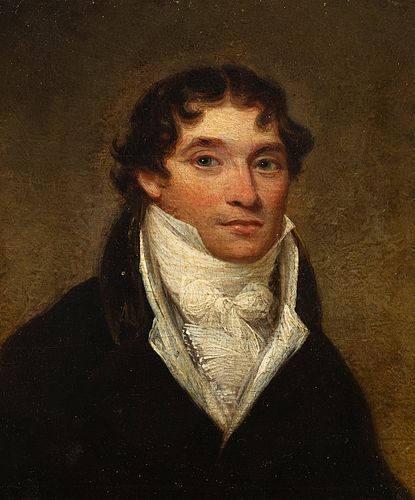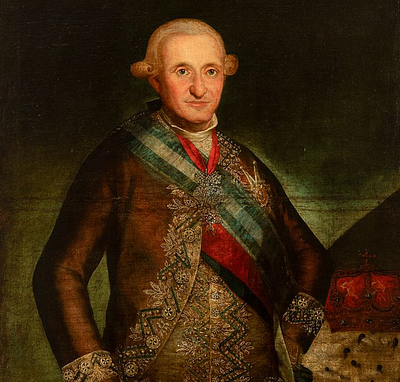English school; circa 1810. "Portrait of a Gentleman, Oil on panel.
Lot 45
About Seller
Setdart Auction House
Carrer Aragó 346
Barcelona
Spain
Setdart Subastas was born in 2004 and is currently the first online art auction in Spain with solidity, prestige and reliability guaranteed by our more than 60,000 users. Setdart has a young, dynamic and enterprising team ready to successfully manage the purchase and sale of art works through custom...Read more
Estimate:
EUR€1,800 - EUR€2,000
$1,935.48 - $2,150.54
Absentee vs Live bid
Two ways to bid:
- Leave a max absentee bid and the platform will bid on your behalf up to your maximum bid during the live auction.
- Bid live during the auction and your bids will be submitted real-time to the auctioneer.
Bid Increments
| Price | Bid Increment |
|---|---|
| EUR€0 | EUR€10 |
| EUR€200 | EUR€25 |
| EUR€500 | EUR€50 |
| EUR€1,000 | EUR€100 |
| EUR€3,000 | EUR€200 |
| EUR€5,000 | EUR€500 |
| EUR€10,000 | EUR€1,000 |
| EUR€20,000 | EUR€2,000 |
| EUR€50,000 | EUR€5,000 |
About Auction
By Setdart Auction House
Sep 22, 2021
Set Reminder
2021-09-22 09:30:00
2021-09-22 09:30:00
America/New_York
Bidsquare
Bidsquare : 22nd September - ARAS JÁUREGUI Private Collection - Old Masters, 19th & 20th Century
https://www.bidsquare.com/auctions/setdart-auction-house/22nd-september---aras-j-uregui-private-collection---old-masters-19th-20th-century-7427
ARAS JÁUREGUI Private Collection - Old Masters, 19th & 20th Century Setdart Auction House sofia@setdart.com
ARAS JÁUREGUI Private Collection - Old Masters, 19th & 20th Century Setdart Auction House sofia@setdart.com
- Lot Description
English school; circa 1810. "Portrait of a Gentleman, Oil on panel. It presents Spanish frame of epoch. Measurements: 15 x 13 cm; 22 x 20 cm (frame). Portrait of gentleman that presents the bust of a young man. The man, who is inscribed on a neutral background of ochre tonality, is dressed with a black jacket. These features emphasise the colour of his skin, which becomes the main focus of the piece's illumination. This is a device by means of which the artist enhances the figure's corporeality and luminosity. The position of the body, erect and with a straight back, combines a casual, natural appearance with an air of distinguished authority. The surface of the work is flat, playing with a precise, meticulous use of brushstrokes. This is based on a great skill in drawing, which gains prominence over colour. An example of this is the use of a measured palette, without great stridency, in which the author has sought a balance between the different tonalities. Another common feature typical of the portraits of this period, which is reflected in this particular work, is the interest in capturing reality, truthfully reflecting the features of the sitter, but without leaving aside idealisation, so that we see an effigy with soft, rounded and friendly forms. The young man is dressed in romantic fashion and related to English dandyism. During this period, men's fashion enjoyed great splendour, focusing men's attention on their aesthetics, and for this reason terms such as currutaco or petimetre arose, in relation to those barons who were concerned with fashion, in such a way that it became a way of life, which affected clothing, as well as behaviour and attitudes. As in the rest of Europe, portraiture became the genre that gained most prominence due to the excellence of painting, as a consequence of the new social structures that were established in the Western world during this century, embodying the ultimate expression of the transformation in the taste and mentality of the new clientele that emerged among the nobility and the wealthy gentry, who were to take the reins of history in this period. While official circles gave precedence to other artistic genres, such as history painting, and the incipient collectors encouraged the profusion of genre paintings, portraiture was in great demand for paintings intended for the more private sphere, as a reflection of the value of the individual in the new society. This genre embodies the permanent presence of the image of its protagonists, to be enjoyed in the privacy of a studio, in the everyday warmth of a family cabinet or presiding over the main rooms of the house.
- Shipping Info
-
In-house shipping available. Please inquire at admin@setdart.com.
-
- Buyer's Premium



 EUR
EUR CAD
CAD AUD
AUD GBP
GBP MXN
MXN HKD
HKD CNY
CNY MYR
MYR SEK
SEK SGD
SGD CHF
CHF THB
THB














